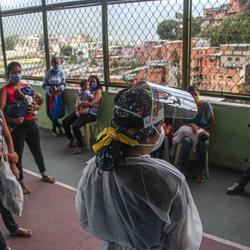The Current Situation in Venezuela
A USIP Fact Sheet
Venezuela is in the midst of an unprecedented social and humanitarian collapse—the result of bad economic policies and political conflict—that has led to food insecurity, the second largest migration crisis in the world, and regional instability. The international community has responded with pressure against the regime coupled with support for elements of the opposition, but to date it has been unsuccessful in bringing about a positive change.
Many experts now believe that the path to re-democratization involves a lengthy negotiation process leading to free and fair presidential elections and the rebuilding of democratic institutions. It must be based on an agreement for coexistence between all political actors and include Venezuelan civil society. Many Venezuelan civic and political leaders are supportive of this course and seek to exert their influence to bring it about. International actors will also be essential players, from a respectful distance and at the appropriate time.
USIP’S Work
Since 2018, the U.S. Institute of Peace has worked to generate the conditions for a peaceful negotiated political settlement in Venezuela by enhancing engagement and supporting moderate civil society actors, especially women, who will play an essential role in a successful negotiation process. The Institute’s expanded alliances with civil society actors include youth, religious and ecumenical leaders, women peacebuilders, and private-sector leaders who aim to advance dialogue, social cohesion, and the promotion of tolerance in order to build fertile ground for a peaceful solution to the crisis.
A Vision for Venezuela’s Future. USIP supports efforts to develop a long-term vision for Venezuela in order to create spaces for dialogue and build bridges across the current political divide. Through this initiative, USIP is countering the negative impact of political and social polarization across the political spectrum, while seeking to offer a compelling vision for Venezuelan society as a whole.
Building a Social Dialogue and Peacebuilding Platform. USIP supports a network of more than 500 organizations across Venezuela who are promoting an inclusive dialogue—with the aim of mitigating deep polarization and helping to reconstruct the democratic social fabric of Venezuelan society. In addition, USIP offers active support to nonviolent peacebuilding cohorts seeking to develop the knowledge and expertise needed to promote peaceful, democratic change.
Mapping Past Political Dialogue Experiences. USIP has undertaken a mapping exercise to identify the various initiatives underway in Venezuela focused on bringing together diverse voices and fostering inclusive spaces for dialogue. Informed by this exercise, USIP will identify opportunities to both scale and complement existing negotiation efforts.
Supporting Women Peacebuilders. USIP has long been engaged in supporting women peacebuilders in countries affected by conflict—including civil society leaders and peace negotiators, women-led organizations, advocates for gender equality, and leaders of nonviolent movements around the globe. In Venezuela, USIP supports a network of women peacebuilders working to mitigate conflict in their communities by providing training on peacebuilding skills and conflict transformation.
Engaging Youth. USIP built on the prominent youth engagement in Colombia through its flagship Generation Change Fellows Program (GCFP) and launched a program for 26 Venezuelan youth fellows throughout Venezuela. The program elevates the work of Venezuelan youth leaders with local organizations through training on peacebuilding skills and community-based dialogue.
Creating a Binational Bridge for Peace between Colombia and Venezuela. The Institute supports a binational engagement called “Puentes Ciudadanos Colombia-Venezuela,” or “Citizen Bridges,” which is led by local civil society leaders across eight border cities. Its binational work is aimed at enhancing coordination on security, humanitarian, and commercial challenges to support more collaboration between the two countries, particularly related to humanitarian border dynamics.
New Policy Options: USIP has used its convening and analytical capacity to help develop new options for policymakers seeking a solution to the Venezuelan crisis. Through in-person and virtual events and published analysis, USIP has sought to raise awareness of issues in the Venezuela crisis that have not received adequate attention and gather the views of experts working on the crisis. It has also sought to provide a platform in the United States for those Venezuelan voices advocating for new approaches to the crisis.
Strengthening Women’s Leadership. The Institute is developing online training and support for grassroots women leaders seeking to rebuild the social fabric in their communities as they prepare to play a stronger role in formal peacebuilding efforts. USIP also supports exchanges between women leaders seeking to bridge political and social divides.



